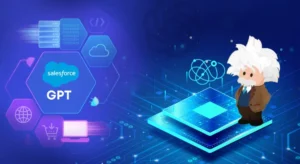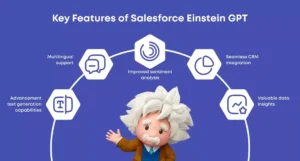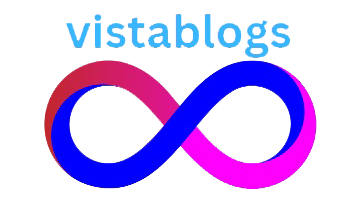Introduction
Salesforce Einstein is a cutting-edge AI-powered tool designed to enhance Customer Relationship Management (CRM) systems. Let’s delve into what makes Salesforce Einstein unique, how it leverages AI and machine learning, its key features and benefits, effective usage for businesses, and any limitations or challenges.
What is Salesforce Einstein?
Salesforce Einstein is an artificial intelligence (AI) platform integrated into the Salesforce CRM ecosystem. Its primary goal is to bring the power of AI and machine learning to businesses, enabling them to make smarter decisions, automate tasks, and enhance customer relationships.
Leveraging AI and Machine Learning
Salesforce Einstein utilizes AI and machine learning to analyze vast amounts of data, uncover patterns, and provide intelligent insights. It enables businesses to automate repetitive tasks, predict future outcomes, and personalize customer interactions. Think of it as your CRM system becoming more intelligent and adaptive over time.

Key Features and Benefits
1. Predictive Analytics
Salesforce Einstein predicts future trends and outcomes based on historical data, helping businesses make informed decisions. For instance, it can forecast sales opportunities, allowing sales teams to focus on high-potential leads.
2. Automated Processes
By leveraging AI, Salesforce Einstein automates routine tasks, saving time and reducing manual effort. This ensures that your team can concentrate on more strategic aspects of customer relationship management.
3. Personalization
The platform offers personalized recommendations for sales, marketing, and customer service. It tailors interactions based on individual customer preferences and behaviors, enhancing the overall customer experience.
4. Natural Language Processing (NLP)
Salesforce Einstein employs NLP to understand and interpret human language. This enables users to interact with the CRM system using natural language, making it more user-friendly and accessible.
5. Integration with Existing Salesforce Tools
Salesforce Einstein seamlessly integrates with other Salesforce products, providing a unified platform for all your CRM needs. This integration enhances the overall efficiency and effectiveness of your business processes.
How Businesses Can Effectively Use Salesforce Einstein
Implementing Salesforce Einstein in your business involves a strategic approach. Here’s a step-by-step guide to effectively leverage this powerful tool:
- Data Quality Matters: Ensure that your data is accurate and up-to-date. The success of AI and machine learning depends on the quality of the input data.
- Define Clear Objectives: Identify specific business goals you want to achieve with Salesforce Einstein. Whether it’s improving sales forecasting or enhancing customer service, having clear objectives will guide your implementation.
- User Training and Adoption: Provide comprehensive training to your team on using Salesforce Einstein. Ensure that your employees understand the new features and how they can integrate them into their daily workflows.
- Start Small, Scale Gradually: Begin with a pilot project to test the waters. Once you see positive results, gradually scale up the implementation across different departments.
- Monitor and Adjust: Regularly monitor the performance of Salesforce Einstein and gather feedback from users. This will help you identify areas for improvement and make necessary adjustments.

Limitations and Challenges
While Salesforce Einstein offers numerous benefits, it’s essential to be aware of its limitations and challenges:
- Data Dependency: The effectiveness of Einstein heavily relies on the quality and quantity of data available. Inaccurate or insufficient data can impact the accuracy of predictions.
- Initial Setup Complexity: Implementing Salesforce Einstein may require initial setup and configuration. Businesses need to allocate time and resources for a seamless integration process.
- Continuous Monitoring and Maintenance: AI models require ongoing monitoring and maintenance to ensure optimal performance. Neglecting this aspect could lead to diminishing accuracy over time.
Real-World Examples
Let’s look at two real-world examples of businesses successfully leveraging Salesforce Einstein:
Example 1: XYZ Company
XYZ Company implemented Salesforce Einstein to analyze customer purchasing patterns. By leveraging predictive analytics, they could anticipate product preferences and launch targeted marketing campaigns. This resulted in a 15% increase in sales within the first quarter.
Example 2: ABC Services
ABC Services integrated Salesforce Einstein into their customer service operations. The platform’s automated processes streamlined ticket resolution, reducing response times by 20%. This not only improved customer satisfaction but also allowed the support team to focus on more complex issues.

Conclusion
Salesforce Einstein represents a significant leap forward in the realm of CRM systems, offering businesses unparalleled capabilities through AI and machine learning. By understanding its features, benefits, and potential challenges, businesses can harness the power of Salesforce Einstein to transform their customer relationships, drive efficiency, and achieve sustainable growth. Start exploring the possibilities today! 🚀
Frequently Asked Questions:
- What is Salesforce Einstein?
- Salesforce Einstein is an AI-powered tool integrated into the Salesforce CRM ecosystem, designed to enhance customer relationship management by leveraging artificial intelligence and machine learning.
- How does Salesforce Einstein use AI and machine learning?
- Salesforce Einstein analyzes data, uncovers patterns, and provides intelligent insights to automate tasks, predict outcomes, and personalize customer interactions.
- What are the key features and benefits of Salesforce Einstein?
- Key features include predictive analytics, automated processes, personalization, natural language processing, and seamless integration with other Salesforce tools. Benefits include informed decision-making, time savings, and improved customer experiences.
- How can businesses effectively use Salesforce Einstein?
- Businesses can maximize the effectiveness of Salesforce Einstein by ensuring data quality, defining clear objectives, providing user training, starting small and scaling gradually, and continuously monitoring and adjusting the implementation.
- Are there any limitations or challenges with Salesforce Einstein?
- Some limitations include data dependency, initial setup complexity, and the need for continuous monitoring and maintenance to ensure optimal performance.

